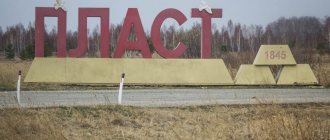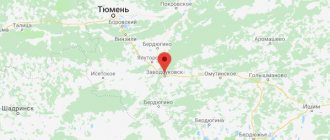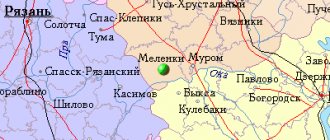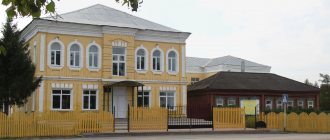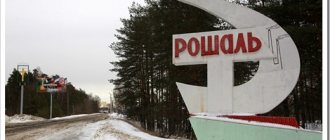This term has other meanings, see Degtyarsk (meanings).
| City Degtyarsk Flag | Coat of arms |
| A country | Russia, Russia |
| Subject of the federation | Sverdlovsk regionSverdlovsk region |
| Urban district | Degtyarsk |
| Coordinates | 56°42′00″ n. w. 60°06′00″ E. d. / 56.70000° n. w. 60.10000° E. d. / 56.70000; 60.10000 (G) [www.openstreetmap.org/?mlat=56.70000&mlon=60.10000&zoom=12 (O)] (Z)Coordinates: 56°42′00″ N. w. 60°06′00″ E. d. / 56.70000° n. w. 60.10000° E. d. / 56.70000; 60.10000 (G) [www.openstreetmap.org/?mlat=56.70000&mlon=60.10000&zoom=12 (O)] (I) |
| Chapter | Busakhin Igor Nikolaevich |
| Based | in 1914 |
| City with | 1954 |
| Square | 19 km² |
| Center height | 370 |
| Population | ↗16,076[1] people (2016) |
| Density | 846.11 people/km² |
| Names of residents | tar people, tar man |
| Timezone | UTC+5 |
| Telephone code | +7 34397 |
| Vehicle code | 66, 96, 196 |
| OKATO code | [classif.spb.ru/classificators/view/okt.php?st=A&kr=1&kod=65484503 65 484 503] |
| Official site | [www.degtyarsk.ru/tyarsk.ru] |
| Degtyarsk Moscow |
Ekaterinburg Degtyarsk |
Audio, photo and video
on Wikimedia Commons
K: Settlements founded in 1914
Degtyarsk
- a city in the Sverdlovsk region, the administrative center of the Degtyarsk urban district. On July 9, 2009, it was included in the list of participants in the route of the World Federation of UNESCO ACC “World Cultural Heritage. Dialogue of cultures, dialogue of civilizations”[2].
Located on the Vyazovka River. Lake Izhbulat is located within the city limits.
Story
The first settlement in the area of modern Degtyarsk dates back to approximately the end of the 19th century (temporary settlements of the 1890s), when working people from the Revdinsky ironworks and from the village.
Krasnoyar, while preparing birch charcoal for the needs of the plant, was simultaneously engaged in cooking tar, because the geographical and geological border of Europe-Asia, passing between Revda and Degtyarsk, also geologically and geographically separated the species of tree plantations: in the “European” Revda, conifers predominated - in mainly pine trees, but in the “Asian” “Degtyarka” mainly birch trees grew, which favored the prosperity of cooking tar from birch substrates. In 1914, the development of the Degtyarskoye sulfur pyrite deposit began. The village of Degtyarka was formed near the deposit. On November 18, 1954, the village was given city status.
In the summer of 1959, the city of Degtyarsk was visited by the 36th Vice President, the future 37th President of the United States, Richard Nixon, who actively communicated with local residents[3]. In 1925-1930, his parents worked at a local copper mine, taken under American concession [www.kp.ru/daily/26261/3140160/].
Degtyarsk is also famous for the fact that on May 1, 1960, over its skies, Soviet air defense forces shot down the American spy pilot Powers in a U-2 plane. At the same time, a Soviet MiG-19 interceptor piloted by senior lieutenant Sergei Safronov was accidentally shot down. The tragedy took place in the skies over Degtyarsk during the May Day demonstration and Safronov’s plane could have crashed into a demonstration of thousands [3], if not for his heroic act - he managed to divert the plane out of the city, thereby saving human lives, but losing his own. In the early 2000s, a monument was erected to Sergei Safronov.
On July 9, 2009, Degtyarsk was included in the list of participants in the route of the World Federation of ACC UNESCO “World Cultural Heritage. Dialogue of cultures, dialogue of civilizations”[4]. Thus, Degtyarsk became the fourth Central Ural city with this status. It is already worn by Yekaterinburg, Nizhny Tagil and Nizhny Sergi.
How to get to Degtyarsk?
By car from Yekaterinburg, go towards the town of Polevsky, after the village of Kurganovo, turn right - towards Degtyarsk. Distance – 53 kilometers.
There is another way: along the Perm highway, then in the Revda area turn to Degtyarsk. The distance from Yekaterinburg will be 60 kilometers.
You can easily get there by public transport. Buses to Degtyarsk run from the southern bus station of Yekaterinburg.
Pavel Raspopov
UraloVed.ru
See also:
Perm copper and its history
Mednorudyanskoye field
The mystery of Mount Azov
Industry
- Branch
- Degtyarsky bakery
- Degtyarskaya garment factory
- Lime plant (extraction and processing of “white stone”)
Previously: Degtyarskoye Mining Department (mining and beneficiation of copper ore). It is planned to build an antimony plant.
| External video files | |
| Video about Degtyarsk | |
| [www.e2-e4.tv/f/news/eksklyuziv/2012/06/15/ne_pridumali_gde_provesti_vyihodnyie_ayda_v_zabroshennyie_po.html Report from e2-e4.tv about an abandoned mine in Degtyarsk] | |
Bazhov about Degtyarsk
In the tale “The Copper Share,” the writer Pavel Bazhov writes about Degtyarsk. The first time he visited here (on Mount Labaz) even before the development of the mines:
“From the top of Labaz the view that was usual for our region of those years opened up: a hilly forest desert with regular squares of clearings, shapeless mowing areas and rare villages. To the north, very close, stood Mount Volchikha, to the south, fifteen kilometers away, that same Balaban, where I had to go ... "
And a few years later the places changed:
“Copper ore is now exported from under Mount Labaz not by carts, but by entire trains. The village near this mountain also does not look like a village. This is a town that counts its population in the tens of thousands.”
Political life
| The information in this section is out of date. You can help the project by updating it and then removing this template. |
At the regional elections held on October 8, 2006, 12,487 voters were included in the voting lists of the Degtyarsk City Election Commission. 3069 people took part in the elections, which amounted to 24.58% of the total number of voters.
Voting results for the elections to the Regional Duma in the Degtyarsky urban district
- United Russia - 1400 people - 59.33%
- Russian Party of Pensioners - 640 - 17.37%
- Homeland - 101 -3.07%
- PCa - 258 - 8.41%
- Communist Party of the Russian Federation - 216 - 7.04%
- LDPR - 136 - 4.43%
- Free Russia - 60 - 1.96%
- Apple - 49 - 1.60%
- Patriots of Russia - 39 - 1.27%
- People's Will - 9 - 0.29%
- Against all lists of candidates - 130 - 4.24%
In the elections for the head of the municipality, held on October 12, 2008, the incumbent head, Valery Trofimov, won by a margin of several hundred votes. Second place was taken by the candidate from the LDPR party, chairman of the Degtyarsk City Duma Nikolai Perkov. Third place went to United Russia candidate Andrei Derbenev. The re-elected mayor Valery Trofimov ran in the elections as a self-nominated candidate. His candidacy was not supported by the United Russia party, of which he is still an active member. The leadership of the regional branch of United Russia, despite earlier promises to expel self-nominated candidates from the party for violating discipline, has reconsidered its position.
Map of attractions
Symbols on the diagram:
1 - Degtyarsk Palace of Culture, nearby houses built by prisoners of war, a school, paving stones st. Kalinina; 2 - bus station; 3 — waste heap of the Kapitalnaya No. 2 mine; 4 - mining administration building, next to it is a monument to the miner and pilot Safronov; 5 — ore sorting building; 6 - hydro-copper shop; 7 - Degtyarsky quarry; 8 - Mount Labaz; 9 — waste heap of the Kapitalnaya No. 1 mine; 10 - Pyrium quarry; 11 - Lake Izhbulat; 12 – Vyazovsky lime quarry; 13 - cemetery for German prisoners of war.
Excerpt characterizing Degtyarsk
- Now, in order to please Moscow girls - il faut etre melancolique. Et il est tres melancolique aupres de m lle Karagin, [one must be melancholic. And he is very melancholy with m elle Karagin,” said Pierre. - Vraiment? [Really?] - said Princess Marya, looking into Pierre’s kind face and never ceasing to think about her grief. “It would be easier for me,” she thought, if I decided to trust someone with everything I feel. And I would like to tell Pierre everything. He is so kind and noble. It would make me feel better. He would give me advice!” – Would you marry him? asked Pierre. “Oh, my God, Count, there are moments when I would marry anyone,” Princess Marya suddenly said to herself, with tears in her voice. “Oh, how hard it can be to love a loved one and feel that... nothing (she continued in a trembling voice) you can’t do for him except grief, when you know that you can’t change it.” Then one thing is to leave, but where should I go?... - What are you, what’s wrong with you, princess? But the princess, without finishing, began to cry. – I don’t know what’s wrong with me today. Don't listen to me, forget what I told you. All Pierre's gaiety disappeared. He anxiously questioned the princess, asked her to express everything, to confide in him her grief; but she only repeated that she asked him to forget what she said, that she did not remember what she said, and that she had no grief other than the one he knew - the grief that Prince Andrei’s marriage threatens to quarrel with his father son. – Have you heard about the Rostovs? – she asked to change the conversation. - I was told that they would be here soon. I also wait for Andre every day. I would like them to see each other here. – How does he look at this matter now? - Pierre asked, by which he meant the old prince. Princess Marya shook her head. - But what to do? There are only a few months left until the year ends. And this cannot be. I would only like to spare my brother the first minutes. I wish they would come sooner. I hope to get along with her. “You have known them for a long time,” said Princess Marya, “tell me, hand on heart, the whole true truth, what kind of girl is this and how do you find her?” But the whole truth; because, you understand, Andrei risks so much, doing this against the will of his father, that I would like to know... A vague instinct told Pierre that in these reservations and repeated requests to tell the whole truth, Princess Marya’s ill will towards her future daughter-in-law was expressed, that she I wanted Pierre not to approve of Prince Andrei’s choice; but Pierre said what he felt rather than thought. “I don’t know how to answer your question,” he said, blushing, without knowing why. “I absolutely don’t know what kind of girl this is; I can't analyze it at all. She's charming. Why, I don’t know: that’s all that can be said about her. “Princess Marya sighed and the expression on her face said: “Yes, I expected and was afraid of this.” – Is she smart? - asked Princess Marya. Pierre thought about it. “I think not,” he said, “but yes.” She doesn't deserve to be smart... No, she's charming, and nothing more. – Princess Marya again shook her head disapprovingly. - Oh, I so want to love her! You will tell her this if you see her before me. “I heard that they will be there one of these days,” said Pierre. Princess Marya told Pierre her plan about how, as soon as the Rostovs arrived, she would become close to her future daughter-in-law and try to accustom the old prince to her. Boris did not succeed in marrying a rich bride in St. Petersburg and he came to Moscow for the same purpose. In Moscow, Boris was indecisive between the two richest brides - Julie and Princess Marya. Although Princess Marya, despite her ugliness, seemed more attractive to him than Julie, for some reason he felt awkward courting Bolkonskaya. On her last meeting with her, on the old prince’s name day, to all his attempts to talk to her about feelings, she answered him inappropriately and obviously did not listen to him. Julie, on the contrary, although in a special way peculiar to her, willingly accepted his courtship. Julie was 27 years old. After the death of her brothers, she became very rich. She was now completely ugly; but I thought that she was not only just as good, but even much more attractive than she was before. She was supported in this delusion by the fact that, firstly, she became a very rich bride, and secondly, that the older she became, the safer she was for men, the freer it was for men to treat her and, without taking on any obligations, take advantage of her dinners, evenings and the lively company that gathered at her place. A man who ten years ago would have been afraid to go every day to the house where there was a 17-year-old young lady, so as not to compromise her and tie himself down, now went to her boldly every day and treated her not as a young bride, but as a acquaintance who has no gender. The Karagins' house was the most pleasant and hospitable house in Moscow that winter. In addition to parties and dinners, every day a large company gathered at the Karagins, especially men, who dined at 12 o'clock in the morning and stayed until 3 o'clock. There was no ball, party, or theater that Julie missed. Her toilets were always the most fashionable. But, despite this, Julie seemed disappointed in everything, told everyone that she did not believe in friendship, nor in love, nor in any joys of life, and expected peace only there. She adopted the tone of a girl who had suffered great disappointment, a girl as if she had lost a loved one or had been cruelly deceived by him. Although nothing of the sort happened to her, they looked at her as if she were one, and she herself even believed that she had suffered a lot in life. This melancholy, which did not prevent her from having fun, did not prevent the young people who visited her from having a pleasant time. Each guest, coming to them, paid his debt to the melancholy mood of the hostess and then engaged in small talk, dancing, mental games, and Burime tournaments, which were in fashion with the Karagins. Only some young people, including Boris, delved deeper into Julie’s melancholic mood, and with these young people she had longer and more private conversations about the vanity of everything worldly, and to them she opened her albums covered with sad images, sayings and poems. Julie was especially affectionate towards Boris: she regretted his early disappointment in life, offered him those consolations of friendship that she could offer, having suffered so much in life herself, and opened her album to him. Boris drew two trees in her album and wrote: Arbres rustiques, vos sombres rameaux secouent sur moi les tenebres et la melancolie. [Rural trees, your dark branches shake off darkness and melancholy on me.] Elsewhere he drew a tomb and wrote: “La mort est secourable et la mort est tranquille “Ah! contre les douleurs il n'y a pas d'autre asile.” [Death is salutary and death is calm;
